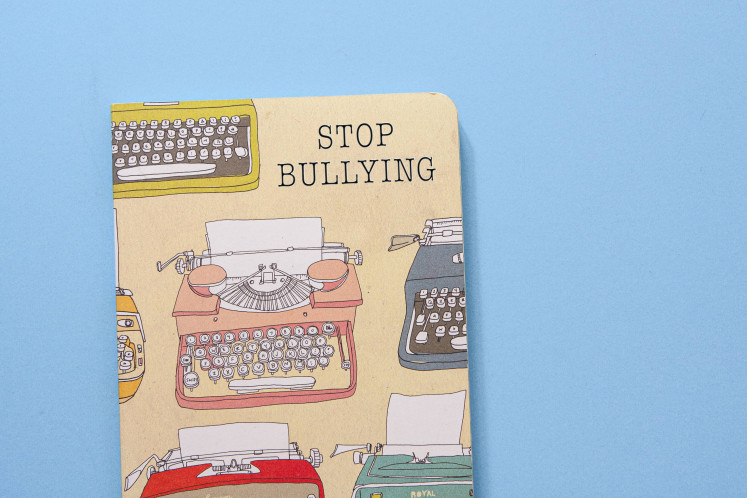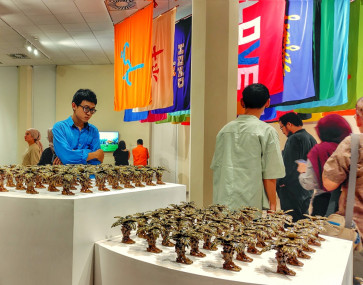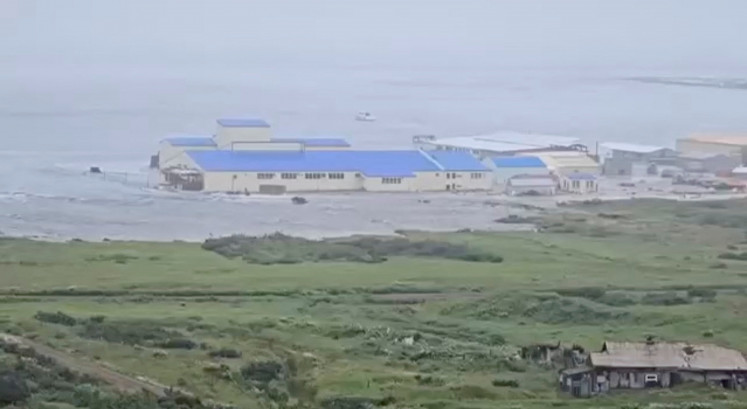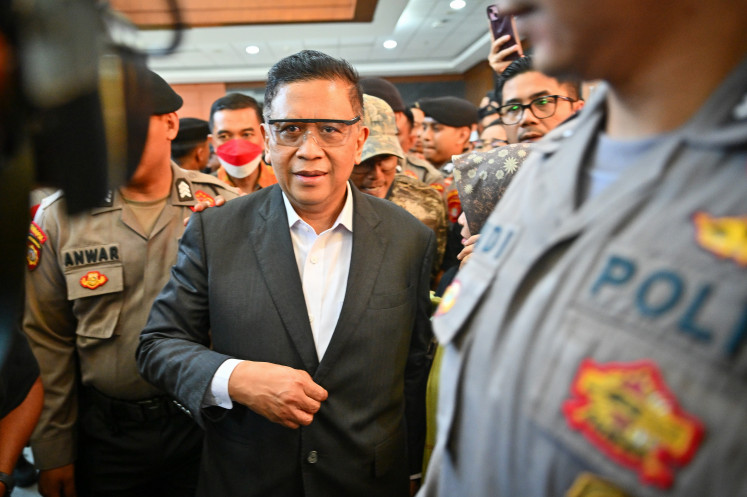Popular Reads
Top Results
Can't find what you're looking for?
View all search resultsPopular Reads
Top Results
Can't find what you're looking for?
View all search resultsOnline hell: Cyberbullying in Indonesia remains vicious and rampant
Change text size
Gift Premium Articles
to Anyone
S
hocking details aside, the death of a bullied student in Tasikmalaya last July goes to show how widespread cyberbullying remains here.
When the news about a boy who died after having intercourse with a cat surfaced online, Indonesians were left in shock. But the tragedy turned even more disturbing when it was found that he was bullied by his classmates into doing the act.
The incident happened in stages: The boy — an 11-year-old student living in Tasikmalaya, West Java — was coerced by his schoolmates into engaging in bestiality with a cat. They recorded the act and uploaded the video online. When the clip went viral, the boy spiraled into a deep depression and his health rapidly declined in a matter of days. Despite the hospital's help with a suspected typhoid fever from his depressive episode, he passed away on July 18.
“This bullying phenomenon is like an iceberg, and so is child abuse,” head of the National Child Protection Commission (KPAI) for Tasikmalaya, Ato Rinanto, said to The Jakarta Post in a call on July 28.
Ato acknowledged that beyond this case, and two others that the Tasikmalaya KPAI has dealt with this year, many cyberbullying cases remain untouched.
“The only cases we [are able to handle] were the ones that have gone viral online,” he admitted.
Dire message: Pictured is a book bears a 'Stop Bullying' message on its cover. Ai Maryati Solihah, a commissioner at the KPAI, said bullying only causes 'heartache, someone being hurt, discriminated against, ostracized and humiliated'. (Unsplash/Dee @ Copper and Wild) (Unsplash/Dee @ Copper and Wild)Digital danger
Many Indonesian youths are no strangers to the danger online. A survey by UNICEF’s U-Report initiative in 2019 showed that 45 percent of 2,777 Indonesian youths aged 14-24 have experienced cyberbullying. The bullying they faced ranged from harassment through chatting applications to unauthorized spread of personal photos or videos.
“I experienced [cyberbullying] when I was in junior high school, but the [bully]’s Twitter page is already gone now,” 24-year-old Ari from Serang, Banten told the Post on July 27. Her bully was a senior at school.
“He tweeted insulting things at me, saying I’m full of pimples, fat, ugly and won’t have [a romantic relationship with] anyone ever in my life,” she described. To this day, it is something that has stayed with Ari.
“It's okay,” she said, mostly to herself. “It’s just not easy to forget.”
In another case, 23-year-old Erwin (not his real name), received a similar treatment in 2019 but inside a LINE messenger app’s group chat composed of his classmates.
“It was the second semester of college, I did not go into this one class. My fault, I woke up late,” he shared to the Post on July 28.
Bogor-based Erwin then asked his classmates in the group chat if he missed anything and whether he was in any trouble with the lecturer.
“Two people told me kindly [about the situation], but someone said, ‘Well, you're screwed up,’ then another one joined in, saying, ‘No, more like [expletive] up.’ Afterward, the first one said to me, ‘I told you this to [hurt] you,’” he shared.
“Maybe for some, it’s a small thing, but I felt so ashamed. I just didn’t expect they would be harsh to me because I felt like I had always been very nice to them.”
Ultimately, and as apparent in the death of the Tasikmalaya student, cyberbullying can really impact someone physically. It does so when the bullying goes to nasty lengths.
Twenty-three-year-old Tia (not her real name) from Bandung, for example, experienced how one person online can lead spiteful masses online to bully you, sending death threats and attempting to “doxx” her location, referring to an act of humiliating someone by revealing their personal information online.
“I had an ex-boyfriend, who I had stopped chatting with for a long time. And in 2018, I happened to have dinner at the same place as he did,” Tia painted the scene for the Post on July 29.
The cause of her problem would be when her ex offered to take her home.
“I thought, well, I didn’t know what was going on in his life anymore, and neither did he,” she said. “As long as I got a free ride, I guess.”
But she did not know that he was currently in a close relationship with a new girl. That was until she saw her Twitter bombarded with notifications at 6 a.m. the next day.
“This girl wrote a whole story of how I was a pelakor [a woman who steals another’s husband or boyfriend] and she shared pictures of me — even from when I was younger — on Twitter,” she said. “People then chimed in and said that I don’t deserve to live, that people like me are going to hell.”
It did not stop there. The false accusation went viral on Twitter to the point that strangers in real life knew her face.
“I used to take the bus to the campus, and people on the bus recognized me and looked at me,” she said.
Everlasting impact
Erwin repeatedly explained that however he tried, he always thought that the cyberbullying he received was his fault.
“I’ve talked to some friends before, but no one really supported me,” he said. “I still can’t get myself to open the chat now because I’m still traumatized.”
Tia also experienced the irreparable damage cyberbullying can cause to mental health.
“I eventually went to a psychiatrist because I became so paranoid. Even just hearing the sound of a motorcycle scared me because sometimes there’s someone stalking me or peeking into the house. And my parents also feel unsafe,” she shared, adding that she does not have the heart to tell them about the situation.
She still routinely goes to a psychiatrist and receives the medicine needed. But Tia still remembered the vile things people said to her.
“I felt like it’s so easy for them to say those things online when they only know one side of the story.”
Anonymous freedom: Online bullying remains rampant due to its freedom for the perpetrator to hide their identity online. (Unsplash/Kaitlyn Baker) (Unsplash/Kaitlyn Baker)More education needed
Sociologist and lecturer Jeanne Noveline Tedja, who specializes in children's welfare, said it has been easier for people to bully others given our migration to the digital world.
“People can have anonymous accounts that do not use their own photos which free them to do the bullying, since the target would not know who they are either,” she told the Post on July 28.
That eventually becomes one of her concerns, especially seeing the social-media landscape in Indonesia.
“If we go to a celebrity’s profile on social media, we can easily find a lot of people commenting negative things, sometimes to a horrifying extent. That’s already cyberbullying because it involves hate speech, ridicule and mockery,” she said.
Which is why Jeanne said that people badly need digital literacy because it also includes digital ethics, so that people would behave better online. Bullies, she assessed, often think that they only intend to joke around, but that does not justify their actions.
“The only one who can say whether an action is considered bullying or just a joke is the victim,” she emphasized.
More adults also need to understand this, she said. Just days after the death of the fifth grader in Tasikmalaya, West Java, Deputy Governor Uu Ruzhanul Ulum regretted the virality that caused the cyberbullying but minimized the act itself.
"I’ve often heard about [that kind of bullying]. Even my friend did [lewd acts] with a buffalo in Cikatomas, and my neighbor with his chicken; that’s just what happened during elementary school years. That’s just the kind of joke. It’s common,” he said to reporters at Tasikmalaya KPAI office on July 23, as quoted by kompas.com.
The comment flustered Ai Maryati Solihah, a commissioner at the KPAI.
“What made it a joke?” she told the Post on July 26. “Because I see no joke in the context of bullying, there’s only heartache — someone being hurt, discriminated against, ostracized and humiliated.”
Ato Rinanto of the Tasikmalaya KPAI also lamented the lack of help a lot of regions can give to children and anyone affected by cyberbullying.
“Today, what kids in Jakarta and kids in the villages consume in the digital space are the same: YouTube, TikTok, Instagram, Facebook, etc. because now there’s no barrier anymore,” he said to the Post on July 28.
“But the difference is, kids in the cities have the solution to this problem. Psychologists can be found anywhere, consultation clinics are everywhere [...] and then parents also have a good foundation of basic education,” he continued. Non-metropolitan cities like Tasikmalaya, he said, barely have any of those things.
“Here, it’s hard to even find a psychologist at times. There’s no clinic for family consultations, no platform to report the cases. At best, neighborhood unit [RT] and community unit [RW] heads take care of them, but that’s only if they’re quick and knowledgeable enough about such things.”
Ato said that this cyberbullying case is a “social phenomenon about the risk from accelerated development of digital technology”.
“This is our problem as a nation, how we should increase education massively and well so that these children are protected from violence in any form,” he concluded.












